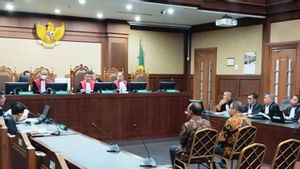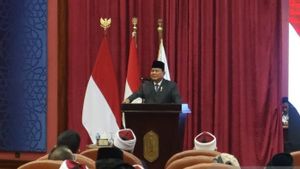JAKARTA - The Attorney General's Office building experienced a fire recently. There has been much speculation regarding the incident, in which netizens are concerned about the burning of case documents.
Although, the AGO confirmed that no case file was burned. However, this incident made us aware of the importance of document filing procedures, especially in the form of digital data.
According to cyber observer Pratama Persadha, digital document archiving is very important to anticipate loss of document files due to natural disasters or fire events. Moreover, judicial institutions such as the AGO, which store many case files.
"Document digitization should have been done, following President Joko Widodo's wish to adopt e-Governance," said Pratama when contacted by VOI, Tuesday, August 25.
Kelapa Communication & Information System Security Research Center (CISSRec) explained that there are two challenges commonly faced in the digital archiving process. First, by digitally re-documenting all existing physical document sheets.
"For example, legal documents and ownership documents are all still physical and are also stored in digital files, either in JPG, PDF or other files," said Pratama.
Second, transferring documents is fully digital, however, "this is still very difficult to do in the country, due to technological and bureaucratic factors that are not yet ready," said Pratama.
The goal, of course, is as a backup. Nevertheless, Pratama said that the use itself is still required to use the original document so far.
Document digitization is still rarely usedEven though it is actually necessary, document digitization is still rarely used because it is related to authentication. Such as the fear of easily counterfeiting digital products.
But actually there is a solution, namely with a digital signature. This means that every digital documentation or digital document must have a digital signature so that its output can be ascertained, and can be used in court or assisting in land management processes and the like.
"Regarding the use of digital documents, both original and documented, it is necessary to obtain clear regulations. Even today, there are still many institutions that do not accept documents with digital signatures, even though this is an effort to modernize bureaucracy that has been carried out in various countries," continued Pratama.
Therefore, document digitization in the country is rarely implemented. Asking this, Pratama said, "this matter is still unclear. Because there are no rules yet. Practically, documentation is carried out independently by several institutions, as a backup if something happens. So it is more of an archive, not an official state document that can be used," explained Primary.
"Even though currently international cooperation affairs have used a lot of digital documents and digital signatures, a shortcoming in terms of bureaucracy that we must pursue," he added.
Concerns of Digital Documents Being Hacked?Contacted separately, Observer and Technology Expert Teguh Prasetya said that digital documents if hacked can still be easily traced to the traces of cyber criminals, compared to physical documents.
"Digital documents if hacked by tracing, tracking and digital forensics are easier than paper documents. The security model can also be layered depending on the needs," Teguh said.
In addition, Teguh also requested that there be prepared human resources (HR) who are educated in an institution, so that they can then prepare a document digitization process that is tested and updated continuously by applying technology according to their needs and priorities.
The English, Chinese, Japanese, Arabic, and French versions are automatically generated by the AI. So there may still be inaccuracies in translating, please always see Indonesian as our main language. (system supported by DigitalSiber.id)













